U.S. and World History
1885 – The roller coaster was patented by La Marcus Thompson of, where else, Coney Island, NY. His coaster was 450 feet long with the highest drop being 30 feet.
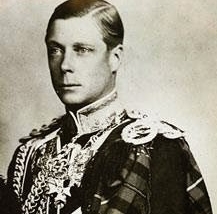
1936 – Following the death of King George V, his son, Edward VIII became King of the United Kingdom. Only months into his reign, he caused a constitutional crisis by proposing marriage to American socialite Wallis Simpson, who had divorced her first husband and was seeking a divorce from her second. The prime ministers of the United Kingdom and the Dominions opposed the marriage, arguing that the people would never accept a divorced woman with two living ex-husbands as queen consort.
Choosing not to end his relationship with Simpson, Edward abdicated on Dec. 11, 1936. With a reign of 326 days, Edward was one of the shortest-reigning monarchs in British history.
1937 – Franklin D. Roosevelt was inaugurated for his second term as President. It was the first time the date of January 20th was used. Prior to that, the date had been March 4, the day of the year on which the Constitution of the United States first took effect in 1789.

1942 – Nazi officials arrived at a “final solution” that called for exterminating Europe’s Jews, during a conference at Lake Wannsee in Berlin. Herman Goering, writing under instructions from Adolf Hitler, had ordered Reinhard Heydrich, SS general and Heinrich Himmler’s number-two man, to submit “as soon as possible a general plan of the administrative, material, and financial measures necessary for carrying out the desired final solution of the Jewish question.”
Heydrich met with Adolf Eichmann, chief of the Central Office of Jewish Emigration, and 15 other officials from various Nazi ministries and organizations at Wannsee, a suburb of Berlin. The agenda was simple and focused: to devise a plan that would render a “final solution to the Jewish question” in Europe. Various gruesome proposals were discussed, including mass sterilization and deportation to the island of Madagascar. Heydrich proposed simply transporting Jews from every corner Europe to concentration camps in Poland and working them to death.
Although the word “extermination” was never uttered during the meeting, the implication was clear. Anyone who survived the inhumane conditions of a work camp would be “treated accordingly.”
Months later, the “gas vans” in Chelmno, Poland, which were killing 1,000 people a day, proved to be the “solution” they were looking for – the most efficient means of killing large groups of people at one time.
The minutes of this conference were kept with meticulous care, which later provided key evidence during the Nuremberg war crimes trials.
1945 – Franklin D. Roosevelt was inaugurated to his fourth term as President of the United States. Three months after his inauguration, he died. Roosevelt’s unparalleled 13 years as president led to the 1947 passing of the 22nd Amendment to the U.S. Contitution, limiting future presidents to a maximum of two elected terms in office, or one elected term if the president already served more than two years of another president’s elected term.
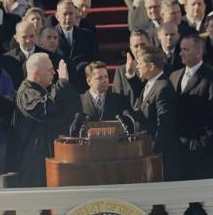
1961 – John F. Kennedy was inaugurated as the 35th President of the United States. Kennedy, the youngest candidate ever elected to the presidency and the country’s first Catholic president, declared that “the torch has been passed to a new generation of Americans” and appealed to Americans to “ask not what your country can do for you, ask what you can do for your country.”
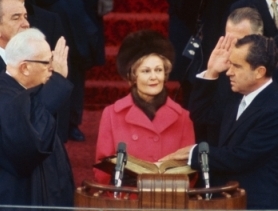
1969 – Eight years after losing a bid for the presidency to John F. Kennedy – and six years after losing a race for California governor, which seemed to indicate his political career was over – Richard M. Nixon was inaugurated as the 37th President of the United States.
1980 – Bleachers at a bullring in Sincelejo, Colombia, collapsed, resulting in the deaths of 222 people. The collapse at Sincelejo, the deadliest tragedy at a sporting event in Colombia’s history, was the result of overcrowding and poor construction. In addition to the 222 spectators killed, hundreds more were injured.
1980 – In a letter to the United States Olympic Committee, President Jimmy Carter proposed that the 1980 Summer Olympics be moved from the planned host city, Moscow, if the Soviet Union failed to withdraw its troops from Afghanistan within a month.
Lord Killanin, president of the International Olympic Committee, reacted quickly to Carter’s statement, saying it was impossible to move the games from Moscow.
After the IOC denied Carter’s request, the USOC voted to boycott the Moscow games, a decision that Carter announced on March 21, 1980. The boycott devastated the hopes of many U.S. athletes, especially after Carter promised to revoke the passports of American athletes who traveled to the games in violation of the boycott. For his part, Killanin called the U.S. boycott a violation of the Olympic charter, pointing out that Moscow had been awarded the games in the mid-1970s as part of a binding contract.
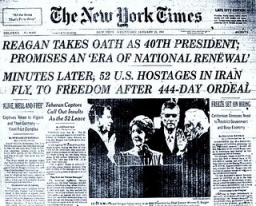
1981 – Iran released 52 Americans held hostage for 444 days, just minutes after the presidency had passed from Jimmy Carter to Ronald Reagan.

1984 – Actor Johnny Weissmuller (winner of five Olympic gold medals for swimming but best known for playing Tarzan in films of the 1930s and 1940s) died from pulmonary edema at the age of 79.
1987 – British negotiator Terry Waite disappeared while attempting to win freedom for Western hostages held in Lebanon. Waite, special envoy of the archbishop of Canterbury, secured the release of missionaries detained in Iran after the Islamic revolution. He also extracted British hostages from Libya and even succeeded in releasing American hostages from Lebanon in 1986. A total of 10 captives had been released through Waite’s efforts before Shiite Muslims seized him during a return mission to Beirut. He was not released for more than four years.

1990 – Actress Barbara Stanwyck (nominated four times for an Academy Award for Best Actress: Stella Dallas, Ball Of Fire, Double Indemnity, and Sorry, Wrong Number, and well known for her role in television’s The Big Valley) died of congestive heart failure at the age of 82.
1991 – Sudan imposed Islamic law nationwide, worsening the civil war between the country’s Muslim north and Christian south.
1992 – Air Inter Flight 148 crashed into a mountain near Strasbourg, France, killing 87 of the 96 people on board. A design flaw in the computer mode selection system resulted in the crew selecting the wrong rate of descent.

1993 – Actress Audrey Hepburn (Breakfast At Tiffany’s, Roman Holiday, My Fair Lady, A Nuns Story, Sabrina, Funny Face and so many more) died of colon cancer at the age of 63.
1996 – Yasser Arafat was elected president of the Palestinian National Council with 88.1 percent of the popular vote, becoming the first democratically elected leader of the Palestinian people in history.
2001 – Hundreds of thousands of protesting Filipinos forced President Joseph Estrada to step down; Vice President Gloria Macapagal Arroyo was sworn in as the new president.

2009 – Barack Obama became the first African-American to be inaugurated as President of the United States.
ROCK & ROLL HISTORY
The late Otis Dewey ‘Slim’ Whitman (‘I Remember You’) was born in 1923.
Rock Factoid: Whitman holds the unique record of having sold the most records (over 70 million) without ever having a song in the Billboard Top 40.
The late Ron Townson (The 5th Dimension – ‘Aquarius/Let the Sunshine In’) was born in 1933.
Paul Stanley (lead singer with KISS – ‘I Was Made For Loving You’) is 63.
Eric Stewart (lead guitarist with The Mindbenders – ‘Game Of Love’, lead guitar and vocalist with Hotlegs – ‘Neanderthal Man’), 10CC – ‘I’m Not In Love’), and lead guitarist for Paul McCartney from 1981-85 – ‘No More Lonely Nights’) is 70.
Rick Evans (singer/songwriter with Zager & Evans – ‘In The Year 2525’) is 72.
1958 – The Silhouettes released ‘Get A Job’.
1958 – KWK, a radio station in St. Louis, wrapped up their “Record Breaking Week”. After the station manager Robert Convey decided rock and roll should be banned from their airwaves, DJs were allowed to play every rock record in their library once on the air and then smash it to pieces. Convey described the stunt as “a simple weeding out of undesirable music.”

1964 – Capitol Records released ‘Meet The Beatles’ in the U.S.
And all hell broke loose
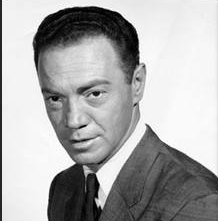
1965 – Alan Freed (Radio DJ who coined the term “rock & roll”) died of uremia and cirrhosis of the liver.

1965 – The Byrds recorded ‘I Knew I’d Want You’ and ‘Mr. Tambourine Man’. The only member of the band who actually played an instrument on the two songs was lead guitarist Jim (later Roger) McGuinn. The rest of the music was supplied by members of the legendary professional sessions men known as The Wrecking Crew – Hal Blaine (drums), Leon Russell (electric piano), Larry Knetchel (bass guitar), and Jerry Cole (rhythm guitar).
1965 – The Miracles recorded ‘The Tracks Of My Tears’.
1967 – Arthur Conley recorded ‘Sweet Soul Music’.

1967 – The Rolling Stones released ‘Between The Buttons’ in England.
Rock Factoid: The next time you hear an artist rave about their new recording, consider Mick Jagger’s interpretation of ‘Between The Buttons’ over the years.
“Our new album is a pretty good indication of where we are going.” … 1967
“I don’t like that album much. I don’t know, it just isn’t any good.” … 1968
“It’s my least favorite Stones album. I didn’t like none of it. I can’t even remember doing it.” … 1969
“It’s a terrible album.” … 1974
“I was really disappointed with it. Isn’t ‘Ruby Tuesday’ on there or something? I don’t think the rest of the songs are that brilliant. I don’t think I thought they were very good at the time, either.” … 1995
1968 – Bob Dylan made his first public appearance in nearly two years performing with The Band at a memorial concert for Woody Guthrie at Carnegie Hall in New York City.
1969 – Elvis Presley recorded ‘Rubberneckin’.
1973 – Jerry Lee Lewis made his debut at the Grand Ole Opry in Nashville, where he promised to only perform country music and refrain from using obscenities. He broke both promises.
1982 – During a Ozzy Osbourne concert in Des Moines, a member of the audience threw an unconscious bat onto the stage. Thinking it was a rubber fake, Osbourne picked it up and bit off its head. He was hospitalized and underwent a series of rabies shots.
1983 – Def Leppard released the ‘Pyromania’ album. It went on to sell over 10 million copies in the U.S.
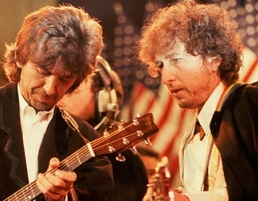
1988 – The Beatles, Bob Dylan, The Beach Boys, The Drifters, and The Supremes were inducted into the Rock & Roll Hall of Fame.
Rock Factoid: Berry Gordy, Jr. (Non-Performer), Woody Guthrie, Lead Belly and Les Paul (Early Influences) were also inducted.
Rock Factoid #2: Considering who the inductees were, the event itself should have been memorable enough but it became infamous for a speech by Mike Love of The Beach Boys. In a rambling, often incoherent statement, Love managed to insult The Beatles, Mick Jagger, Diana Ross and Bruce Springsteen.
1996 – Twenty-six years after their breakup, The Beatles once again had a solid hold on the Billboard album charts.
Rock Factoid: ‘Anthology 1’ sat at #11 in the Top 200. Meanwhile, Billboard’s Pop Catalog Chart contained five albums from the Fab Four: ‘Sgt. Pepper’s Lonely Hearts Club Band’ (#3), ‘Abbey Road’ (#4), ‘The Beatles/1967-1970’ (#6), ‘The Beatles {White Album}’ (#10) and ‘The Beatles/1962-1966’ (#11).

1997 – Ben and Jerry’s introduced Phish Food, a new flavor of ice cream named after the rock group Phish. The ingredients are chocolate ice cream, marshmallows, caramel and fish-shaped fudge.
1999 – Bill Albaugh (drummer with The Lemon Pipers – ‘Green Tambourine’) died of a heart attack.
2000 – Ray Jones (bass guitar with Billy J. Kramer with The Dakotas – ‘Bad To Me’) died of a heart attack.
2002 – George Harrison posthumously topped the UK Singles Chart with ‘My Sweet Lord’. Harrison’s single replaced Aaliyah’s ‘More Than A Woman’, the only time in chart history that one deceased artist had taken over from another at #1.
2012 – Etta James (‘At Last’) died from leukemia.

2012 – Larry Butler (keyboards with The Gentrys – ‘Keep On Dancin’) died from natural causes.
Rock Factoid: Butler co-wrote B.J. Thomas’ ‘Hey, Won’t You Play Another Somebody Done Somebody Wrong Song’ and produced Kenny Rogers’ ‘The Gambler’ and ‘Lucille’.
2013 – Bob Engemann (The Lettermen – ‘Theme From A Summer Place’) died of complications following heart bypass surgery.
SPORTS HISTORY
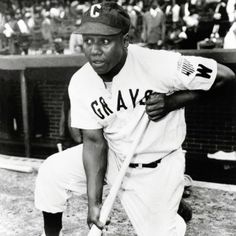
1947 – Josh Gibson (a catcher in the Negroes Leagues, but never played in the Major Leagues because of an unwritten “gentleman’s agreement” policy that prevented non-white players from participating) died of a stroke at the age of 35.
Baseball historians consider Gibson to be among the best catchers and power hitters in the history of any league, including the Major Leagues. In 1933, he hit .467 with 55 home runs in 137 games against all levels of competition. His lifetime batting average is said to be higher than .350, with other sources putting it as high as .384, the best in Negro League history. He was elected to the Baseball Hall of Fame in 1972.
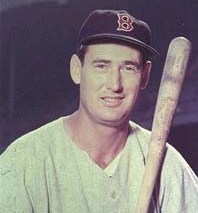
1966 – Ted Williams was the sole eligible candidate elected the Baseball Hall of Fame by the elected to the Hall of Fame by the Baseball Writers’ Association of America. The Veterans Committee elected former Yankees manager Casey Stengel.
Williams, one of the greatest hitters in baseball history (and the last player to hit over .400 in a season when he hit .406 in 1941), was a two-time American League Most Valuable Player, six-time batting champion, 17-time All-Star and a two-time Triple Crown winner. He did all of that despite missing most of five seasons due to military service. He finished his career with a .344 batting average, 521 home runs, and a .482 on-base percentage, the highest of all time.
Oddly (or maybe not, considering the strange ways of the BBWAA), 20 writers left Williams off their ballot.

1980 – The Pittsburgh Steelers defeated the Los Angeles Rams, 31-19, at Super Bowl XIV. The Rams led 13-10 at the half and 19-17 at the end of the third quarter, but a 73-yard pass from Steelers quarterback Terry Bradshaw to John Stallworth and a Franco Harris 1-yard run changed that in the fourth quarter.
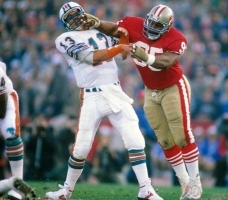
1985 – The San Francisco 49es defeated the Miami Dolphins, 38-16, at Super Bowl XIX. The outcome wasn’t a big surprise. The 49ers were the first team to win 15 games in a regular season (15-1), and had ten players voted to the Pro Bowl.
1996 – Dale Ellis became the first NBA player to make 1,200 career three point baskets.
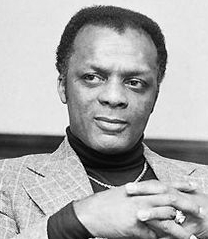
1997 – Curt Flood, who spent most of his career as an outfielder for the St. Louis Cardinals, but is better known for his role in eliminating the reserve clause in baseball, died after a prolonged battle with lung cancer. He was 59
Flood considered the reserve clause to be unfair because it kept players secured for life by the team with which they originally signed, even when they had satisfied the terms and conditions of those contracts.
Compiled by Ray Lemire ©2015 RayLemire.com. All Rights Reserved.
You may not, under any circumstances, reproduce, record, publish, republish, post, transmit, publicly display, publicly exhibit or distribute any articles or photographs on RayLemire.com without obtaining the express written consent of the Operator.